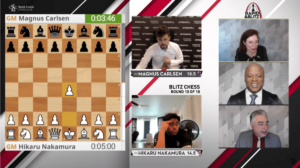The Chess ‘Boom’ came at just the right time
The second event of the Grand Chess Tour 2021 concluded earlier last week in Paris and thus became only the fifth in-person super tournament to do so since the start of lockdown. The Paris Rapid and Blitz as it was called, was won by American Grandmaster Wesley So. Second place went to Ian Nepomniachtchi from Russia while 18 year old Alireza Firouza and French Grandmaster Maxime Vachier-Lagrave shared third spot.

However, in a broader context, this represents another milestone in an interesting road back to ‘normality’ for chess, as the next few months will see big tournaments played in Zagreb, Sochi and Missouri before culminating in Dubai for the World Chess Championship match this November. These events on location will be interspersed among various rounds of the Meltwater Champions Chess Tour, an online extravaganza of chess which will also feature most of the top players on a regular basis. Based on the excitement generated by contests thus far in this hybrid yet congested calendar, eyeballs for these tournaments will be expected to exponentially increase from one to the next. And why wouldn’t they? Interest in the game of kings has continued to skyrocket over this past year, and the aforementioned WC match is widely expected to be the most followed one yet. But just how did chess manage to thrive in a pandemic that laid waste to most sports? By adapting of course.
An Opportunity amidst chaos
When the 2020 Candidates Tournament was suspended midway through on March 25th 2020, things were looking very uncertain in the world of chess. On April 3rd , all five events of the Grand Chess Tour were cancelled and in June, with no resolution reached on the process to select a challenger for the World Championship, Magnus Carlsen’s title defence was pushed to 2021.
However, during this period top players and organizers also realized that chess was in a unique position compared to all other sports – it was an indoor game played outdoors. Crowds in chess certainly add to the occasion in high-level tournaments, but with library-like silence expected in auditoriums, fans never create an atmosphere akin to outdoor sports like cricket and football. Even in a ‘gentlemen’s game’ like tennis where the spectators are asked to be quiet when play is in session, claps of appreciation and groans of despair in between points make up the very fabric of the sport. Hence, while the return of these games without crowds produced an insipid experience, the wholesale migration of chess from over-the-board (OTB) to online was relatively smooth.
Various events were organized throughout the year to keep the fans engaged, a process initiated by the world champion himself with the Magnus Carlsen Chess Tour, while also committing the largest ever prize fund of one million USD. Other events such as the Clutch Chess International and St. Louis Rapid and Blitz were also successful, with concerns over issues such as mouse-slips and player professionalism not materializing.

Tweaking the formula
An interesting point here is the way these tournaments have been covered. Chess is a complicated game in itself with calculation at its very essence, but this goes up several notches when the world’s elite are battling it out. Following along can prove arduous even for seasoned players, let alone newcomers. As chess journalist and author of The Greenbecker Gambit , Ben Graff told the Sports Gazette, “I think very very few people will understand chess the way those elite players do but it is all about the commentators who can make the game accessible; when they describe it you can have enough to feel engaged enough to want to follow along”.
This can definitely be seen in the coverage of any tournament over the past year, as chess has made itself more welcoming to beginners. Take the Meltwater Champions Chess Tour for example. According to its organizers, the Play Magnus Group, ‘A significant addition to the launch of the 2021 season was the unveiling of the new global studio in Oslo which features commentary and lifestyle content to also cater to non-chess playing audiences’.
Hosted by Kaja Snare, a chess journalist alongside GM David Howell and WGM Jovanka Houska, the coverage does away with all chess related jargon in favour of simplicity. Descriptive notation (Re5, Bd3 etc.) for the squares and moves are never used, with the commentators instead using phrases like, ‘Now Magnus can slide the rook one square to the left to attack the queen’. While the grandmasters are very much the experts and often bring up the ‘analysis board’ to discuss lines and variations, Kaja keeps it simple with updates, anecdotes and interviews that do not require extensive knowledge of the game to comprehend. This approach paid dividends as in February 2021, the Opera Euro Rapid (third event of the Meltwater Tour) broke the record for peak concurrent viewers on an online platform for a professional chess tournament with 283,000. The numbers have been at similar levels for every tournament since.
Thanks to all who watched the #FTXCryptoCup! @DavidHowellGM, @thelittlehat & @KajaSnare will be back with the next event in the @Meltwater Champions Chess Tour on June 26th! #ChessChamps https://t.co/eqhmr4g3Py pic.twitter.com/kD2sL9xfsq
— Champions Chess Tour (@ChampChessTour) May 31, 2021
Lifting the veil
Another major factor in the popularity explosion of chess has been one of its most popular protagonists taking to streaming – GM Hikaru Nakamura. Now, it is important to note that chess streamers existed before him – the Botez sisters have been streaming since 2016, and Levy Rozman, better known as GothamChess, has been a streaming partner on Chess.com since 2017. But when five-time US champion and current FIDE Blitz #1, Hikaru Nakamura entered the realm of Twitch in March 2020, chess elevated itself into a new strata of popularity.
Not only were audiences now privy to masterclasses in theory and calculation by one of the best ever, his personality was on show. Everyone knew Hikaru the ‘speed demon’ but by revealing Hikaru the man he became relatable, something that his level of genius and technical expertise in the game prevented from happening in the sphere of chess.
His ability to blitz out the best moves in highly intricate positions with preternatural ease while falling flat in understanding a simple meme on his reddit page, the zeitgeist of a generation he is so hilariously disconnected from, is a joke in itself among his viewers. ‘PogChamps’, his initiative alongside Chess.com to grow the game by getting popular streamers with no knowledge of the game to participate in a tournament was a massive success. It received its fair share of criticism, even from a few fellow players as they scoffed at its embarrassing show of quality, but chess as a community has been accused of being too closed on multiple occasions with its stakeholders taking themselves way too seriously. Nakamura changed that perception.
ahhh yes, how could we have missed that @GMHikaru 🤪 pic.twitter.com/2HSHgPFhSj
— TSM FTX (@TSM) May 13, 2021
Since his foray into the domain of Twitch and Youtube, several other top players have followed suit – with notable names such as Anish Giri, Daniil Dubov, Ian Nepomniachtchi and WC Magnus Carlsen posting semi-regular content around their games, while also drawing the curtain to reveal more of their personality. As Ben Graff put it, “I think there is a recognition now that chess players really have a story to tell and can be very interesting sporting icons when aligned with some of the media-savviness we see”.
Perfect timing
With this eclectic blend of access, lingo-free analysis and show of character from top players, chess was ready for ‘the boom’, and it came in October 2020, with the release of the Queen’s Gambit. In the first 28 days of its release, the Netflix show about an orphaned chess prodigy was watched in over 62 million households.

“I was struck by the number of non-chess playing friends I have who wanted to talk to me about chess after the Queen’s Gambit, asking questions like where can I learn to play chess, where can my child learn to play chess, what books should I read etc. People who I never would have guessed would ask me these questions were asking me these questions! Just from that perspective it has been a massive massive success”, said Ben Graff, neatly summing up its impact. The all-time high for number of games played on websites like Lichess and Chess.com since then have constantly kept increasing, not to mention the viewers on any chess based stream/tournament. Most of them, being newcomers to the game, might have left just as quickly, but as this piece has outlined, the developments over the past year has meant that chess was ready to embrace them.
With a plethora of new eyeballs, hybrid formats and players turned personalities, chess finds itself in an interesting position. The sheer number of tournaments held closely together to satiate hungry fans has come with its fair share of complications. Top players are now not only expected to seamlessly switch between time controls, but also between mediums of interface (OTB/online). Not to mention the lack of time to prepare opening variations, leading to prosaic games and unwarranted loss of rating points, an argument expertly made by GM Teimour Radjabov recently. For the most part however, chess has managed to succeed where many other sports have failed over the past year by being structurally flexible and ready to adapt – something its players have been doing for centuries now.